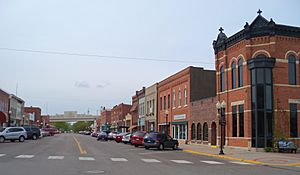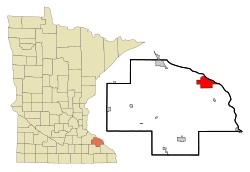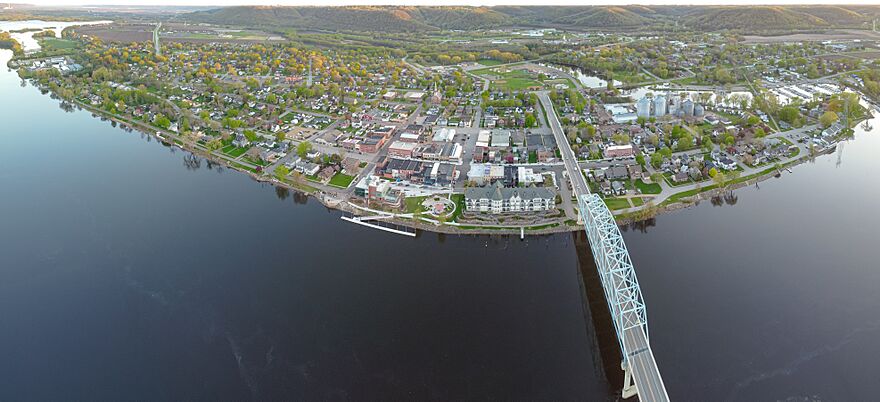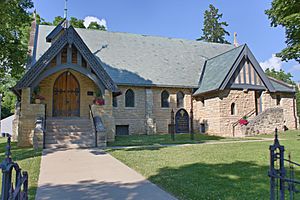Wabasha, Minnesota facts for kids
Quick facts for kids
Wabasha, Minnesota
|
|
|---|---|

Downtown Wabasha
|
|
| Motto(s):
"Governor's Fit City"
|
|

|
|
| Country | United States |
| State | Minnesota |
| County | Wabasha |
| Area | |
| • Total | 9.25 sq mi (23.96 km2) |
| • Land | 8.19 sq mi (21.22 km2) |
| • Water | 1.06 sq mi (2.75 km2) |
| Elevation | 686 ft (209 m) |
| Population
(2020)
|
|
| • Total | 2,559 |
| • Density | 312.42/sq mi (120.62/km2) |
| Time zone | UTC-6 (Central (CST)) |
| • Summer (DST) | UTC-5 (CDT) |
| ZIP code |
55981
|
| Area code(s) | 651 |
| FIPS code | 27-67378 |
| GNIS feature ID | 0653695 |
| Website | www.wabasha.org |
Wabasha is a city in Minnesota, United States. It's the main city, or county seat, of Wabasha County. In 2020, about 2,559 people lived there. The city is located right on the famous Mississippi River, close to where the Zumbro River joins it.
Contents
The Name of Wabasha
Wabasha gets its name from a group of Mdewakanton Dakota chiefs. These chiefs were known as Wapi-sha, which means red leaf in their language. There were three main chiefs with this name:
- The father (who lived from 1718 to 1806)
- The son (who lived from 1768 to 1855)
- The grandson (who lived from about 1816 to 1876)
The second chief, Wabishaw the son, signed an important treaty with the United States in 1830. This treaty was made in Prairie du Chien. The grandson, Wabasha III, also signed treaties in 1851 and 1858. These treaties gave the southern part of what is now Minnesota to the United States. This led to his people moving first to the Minnesota River, then out of Minnesota to the Crow Creek Reservation in Dakota Territory, and finally to the Santee Reservation in Nebraska, where the last Chief Wabasha passed away.
A Look at Wabasha's History
The city of Wabasha was officially planned out and set up in 1854.
Wabasha's Location and Landscape
Wabasha covers an area of about 9.25 square miles (23.96 square kilometers). Most of this area is land, with a smaller part being water.
The city is situated along the Mississippi River, right at the base of Lake Pepin.
You can reach Wabasha using U.S. Highway 61 and Minnesota Highway 60. Nearby, you'll also find Wisconsin Highways 25 and 35.
Wabasha's Climate
Wabasha has a "Warm Summer Continental Climate." This means it has warm summers and cold, snowy winters.
People of Wabasha
| Historical population | |||
|---|---|---|---|
| Census | Pop. | %± | |
| 1860 | 894 | — | |
| 1870 | 1,739 | 94.5% | |
| 1880 | 2,088 | 20.1% | |
| 1890 | 2,489 | 19.2% | |
| 1900 | 2,528 | 1.6% | |
| 1910 | 2,622 | 3.7% | |
| 1920 | 2,249 | −14.2% | |
| 1930 | 2,212 | −1.6% | |
| 1940 | 2,368 | 7.1% | |
| 1950 | 2,468 | 4.2% | |
| 1960 | 2,500 | 1.3% | |
| 1970 | 2,371 | −5.2% | |
| 1980 | 2,372 | 0.0% | |
| 1990 | 2,384 | 0.5% | |
| 2000 | 2,599 | 9.0% | |
| 2010 | 2,521 | −3.0% | |
| 2020 | 2,559 | 1.5% | |
| U.S. Decennial Census | |||
Population in 2020
In 2020, the city had 2,559 people. Most residents (93.0%) were White. Other groups included Black or African American (1.4%), Asian (0.4%), and Native American (0.3%). About 2.6% of the population identified as Hispanic or Latino.
Population in 2010
Back in 2010, there were 2,521 people living in Wabasha. There were 1,144 households, and 654 of these were families. The average household had about 2 people, and the average family had about 2.7 people.
The median age in the city was 48.8 years. About 19.4% of the people were under 18 years old. Many residents were 65 years or older, making up 26.8% of the population.
Getting Around Wabasha
The Empire Builder train, run by Amtrak, goes through Wabasha. This train travels between Seattle/Portland and Chicago. However, it doesn't stop in Wabasha. If you want to catch the train, the closest stations are in Red Wing, about 31 miles northwest, and Winona, about 32 miles southeast.
Fun Things to See and Do
Wabasha is home to the National Eagle Center. This is a great place to learn about and see bald eagles up close!
The city also has Grace Memorial Episcopal Church. This is the oldest Episcopal church in Minnesota and features a beautiful stained-glass window made by Tiffany.
Famous People from Wabasha
Many interesting people have connections to Wabasha, including:
- Larry Brandenburg, an actor
- John R. Foley, a former congressman from Maryland
- Joyce M. Lund, a journalist and state legislator from Minnesota
- Chief Tamaha, a Mdewakanton Sioux chief
- Tom Tiffany, a congressman from Wisconsin
- John Van Dyke, a congressman from New Jersey and later a member of the Minnesota Senate
- Jim "Baron Von" Raschke, a retired professional wrestler
Schools in Wabasha
Wabasha has schools for students of all ages.
- Wabasha-Kellogg Independent School District #811 runs a school that teaches students from kindergarten all the way through 12th grade.
- St. Felix Catholic School is a private school that offers classes for younger children, from pre-kindergarten to 6th grade.
See also
 In Spanish: Wabasha (Minnesota) para niños
In Spanish: Wabasha (Minnesota) para niños



